Related Research Articles
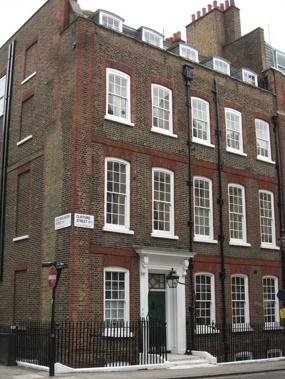
The Drones Club is a recurring fictional location in the stories of British humorist P. G. Wodehouse. It is a gentlemen's club in London. Many of Wodehouse's Jeeves and Blandings Castle stories feature the club or its members.

Jeeves is a fictional character in a series of comedic short stories and novels by English author P. G. Wodehouse. Jeeves is the highly competent valet of a wealthy and idle young Londoner named Bertie Wooster. First appearing in print in 1915, Jeeves continued to feature in Wodehouse's work until his last completed novel Aunts Aren't Gentlemen in 1974, a span of 60 years.

Agatha Gregson, née Wooster, later Lady Worplesdon, is a recurring fictional character in the Jeeves stories of the British comic writer P. G. Wodehouse, being best known as Bertie Wooster's Aunt Agatha. Haughty and overbearing, Aunt Agatha wants Bertie to marry a wife she finds suitable, though she never manages to get Bertie married, thanks to Jeeves's interference.

Bertram Wilberforce Wooster is a fictional character in the comedic Jeeves stories created by British author P. G. Wodehouse. An amiable English gentleman and one of the "idle rich", Bertie appears alongside his valet, Jeeves, whose intelligence manages to save Bertie or one of his friends from numerous awkward situations. Bertie Wooster and Jeeves have been described as "one of the great comic double-acts of all time".
Dahlia Travers is a recurring fictional character in the Jeeves stories of English comic writer P. G. Wodehouse, being best known as Bertie Wooster's bonhomous, red-faced Aunt Dahlia. She is much beloved by her nephew, in contrast with her sister, Bertie's Aunt Agatha.
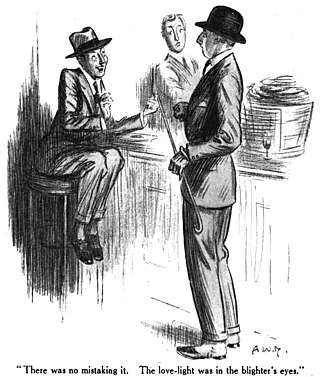
Richard P. "Bingo" Little is a recurring fictional character in the comedic Jeeves and Drones Club stories of English writer P. G. Wodehouse, being a friend of Jeeves's master Bertie Wooster and a member of the Drones Club.

Honoria Glossop is a recurring fictional character in the Jeeves stories by English comic writer P. G. Wodehouse. Athletic as well as scholarly, she is a formidable young lady and one of the women whom Bertie Wooster reluctantly becomes engaged to.

The Inimitable Jeeves by P. G. Wodehouse was the first of the Jeeves novels, although not originally conceived as a single narrative, being assembled from a number of short stories featuring the same characters. The book was first published in the United Kingdom by Herbert Jenkins, London, on 17 May 1923 and in the United States by George H. Doran, New York, on 28 September 1923, under the title Jeeves.
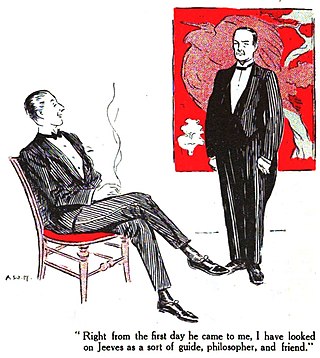
"Jeeves in the Springtime" is a short story by P. G. Wodehouse, and features the young gentleman Bertie Wooster and his valet Jeeves. The story was published in The Strand Magazine in December 1921 in London, and in Cosmopolitan in New York that same month. The story was also included in the 1923 collection The Inimitable Jeeves as two separate chapters, "Jeeves Exerts the Old Cerebellum" and "No Wedding Bells for Bingo".
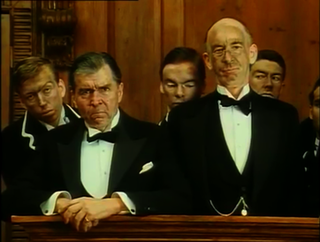
Sir Roderick Glossop is a recurring fictional character in the comic novels and short stories of P. G. Wodehouse. Sometimes referred to as a "nerve specialist" or a "loony doctor", he is a prominent practitioner of psychiatry in Wodehouse's works, appearing in several Jeeves stories and in one Blandings Castle story.
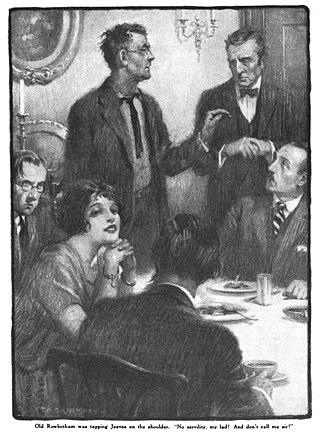
"Comrade Bingo" is a short story by P. G. Wodehouse, and features the young gentleman Bertie Wooster and his valet Jeeves. The story was published in The Strand Magazine in London in May 1922, and in Cosmopolitan in New York that same month. The story was also included in the 1923 collection The Inimitable Jeeves as two separate chapters, "Comrade Bingo" and "Bingo Has a Bad Goodwood".

Very Good, Jeeves is a collection of eleven short stories by P. G. Wodehouse, all featuring Jeeves and Bertie Wooster. It was first published in the United States on 20 June 1930 by Doubleday, Doran, New York, and in the United Kingdom on 4 July 1930 by Herbert Jenkins, London. The stories had all previously appeared in Strand Magazine in the UK and in Liberty or Cosmopolitan magazines in the US between 1926 and 1930.
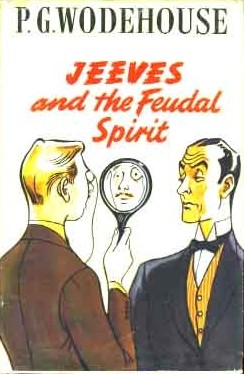
Jeeves and the Feudal Spirit is a comic novel by P. G. Wodehouse, first published in the United Kingdom on 15 October 1954 by Herbert Jenkins, London and in the United States on 23 February 1955 by Simon & Schuster, Inc., New York, under the title Bertie Wooster Sees It Through. It is the seventh novel featuring Bertie Wooster and his valet Jeeves.
The following is a list of recurring or notable fictional locations featured in the stories of P. G. Wodehouse, in alphabetical order by place name.
Claude Cattermole "Catsmeat" Potter-Pirbright is a recurring fictional character in the Jeeves and Drones Club stories of English comic writer P. G. Wodehouse, being a longtime school friend of Jeeves's master Bertie Wooster and a member of the Drones Club. A West End actor known as "Claude Cattermole" on stage, he is known to his friends by the nickname "Catsmeat".

"Scoring off Jeeves" is a short story by P. G. Wodehouse, that features a young gentleman Bertie Wooster and his valet Jeeves. The story was published in The Strand Magazine in London in February 1922, and then in Cosmopolitan in New York in March 1922. The story was also included in the 1923 collection The Inimitable Jeeves as two separate chapters, "The Pride of the Woosters Is Wounded" and "The Hero's Reward".

"The Metropolitan Touch" is a short story by English writer P. G. Wodehouse, and features the young gentleman Bertie Wooster and his valet Jeeves. The story was published in The Strand Magazine in London in September 1922, and then in Cosmopolitan in New York that same month. The story was also included in the 1923 collection The Inimitable Jeeves.

"Bingo and the Little Woman" is a short story by P. G. Wodehouse, and features the young gentleman Bertie Wooster and his valet Jeeves. The story was published in The Strand Magazine in London in November 1922, and then in Cosmopolitan in New York in December 1922. The story was also included in the collection The Inimitable Jeeves as two separate stories, "Bingo and the Little Woman" and "All's Well".
"Clustering Round Young Bingo" is a short story by P. G. Wodehouse, and features the young gentleman Bertie Wooster and his valet Jeeves. The story was published in the Saturday Evening Post in the United States in February 1925, and in The Strand Magazine in the United Kingdom in April 1925. The story was also included in the 1925 collection Carry On, Jeeves.
References
- Notes
- ↑ Fergusson, James (1 June 2007). "Bibliography – Proofs, firsts and file copies". The Times Literary Supplement (5435): 28.
- ↑ Wodehouse, P. G. (2013). Ratcliffe, Sophie (ed.). P. G. Wodehouse: A Life in Letters. W. W. Norton & Company. p. 477. ISBN 978-0786422883.
- ↑ Cawthorne (2013), p. 195.
- ↑ Garrison (1991), p. 7.
- ↑ Wodehouse (2008) [1923], The Inimitable Jeeves, chapter 1, p. 19.
- ↑ Wodehouse (2008) [1923], The Inimitable Jeeves, chapter 2, p. 22.
- ↑ Wodehouse (2008) [1923], Carry On, Jeeves, chapter 9, p. 227.
- ↑ Wodehouse (2008) [1923], Carry On, Jeeves, chapter 9, p. 234.
- ↑ Ring & Jaggard (1999), p. 154.
- ↑ Garrison (1991), pp. 106–107.
- ↑ Wodehouse (1987) [1973], Bachelors Anonymous, ch. 5, p. 30. "He had met Sally Fitch only twice, but love, to quote Rosie M. Banks (A Kiss at Twilight, Chapter Three), had cast its silken fetters about him."
- ↑ Wodehouse (1987) [1973], Bachelors Anonymous, ch. 6, p. 49.
- ↑ Wodehouse (1987) [1973], Bachelors Anonymous, ch. 11, p. 107.
- ↑ Wodehouse (2008) [1923], The Inimitable Jeeves, chapter 18, p. 242.
- ↑ Wodehouse (2008) [1949], The Mating Season, chapter 17, pp. 167–170.
- ↑ Wodehouse, P. G. (1974) [1972]. Pearls, Girls and Monty Bodkin (Reprinted ed.). London: Penguin Books. ISBN 9780140038354. Chapter 9, pp. 116–117.
- ↑ "Navy Nurse". tinypineapple.com. 13 August 2003. Retrieved 8 August 2017.
- ↑ Susannah (30 October 2013). "Ship's Nurse [review]". Vintage Nurse Romance Novels. Retrieved 6 August 2019.
- ↑ Jenkins, Emily (11 January 2000). "A shot of the needful". Salon.com . Retrieved 8 August 2017.
- ↑ Gates, David; Sawhill, Ray (3 August 1998). "Battle of the Books: The Controversy over the 100 Top Novels". Newsweek. Archived from the original on 2 May 2009. Retrieved 8 August 2017.
- ↑ Mark, Lewisohn (2003). "The World of Wooster (with cast)". BBC Comedy Guide. Archived from the original on 13 March 2007.
- ↑ Taves, Brian (2006). P. G. Wodehouse and Hollywood: Screenwriting, Satires and Adaptations. McFarland & Company. p. 187. ISBN 978-0786422883.
- ↑ "Jeeves and Wooster Series 4, Episode 3". British Comedy Guide. Retrieved 9 January 2018.
- Bibliography
- Cawthorne, Nigel (2013). A Brief Guide to Jeeves and Wooster. Constable & Robinson. ISBN 978-1-78033-824-8.
- Garrison, Daniel H. (1991) [1989]. Who's Who in Wodehouse (Revised ed.). Constable & Robinson. ISBN 1-55882-087-6.
- Kuzmenko, Michel (22 March 2007). "Wodehouse Bibliography". The Russian Wodehouse Society. Retrieved 13 August 2007.
- Reggie (16 March 2007). Wodehouse Who's Who: Rosie M. Banks, Mrs Bingo Little. Archived from the original on 8 May 2008.
{{cite book}}:|work=ignored (help) - Ring, Tony; Jaggard, Geoffrey (1999). Wodehouse in Woostershire. Porpoise Books. ISBN 1-870-304-19-5.
- Wodehouse, P. G. (1987) [1973]. Bachelors Anonymous (Reprinted ed.). Harmondsworth, England: Penguin Books. ISBN 0140040536.
- Wodehouse, P. G. (2008) [1923]. The Inimitable Jeeves (Reprinted ed.). Arrow Books. ISBN 978-0099513681.
- Wodehouse, P. G. (2008) [1930]. Very Good, Jeeves (Reprinted ed.). Arrow Books. ISBN 978-0099513728.
- Wodehouse, P. G. (2008) [1949]. The Mating Season (Reprinted ed.). Arrow Books. ISBN 978-0099513773.